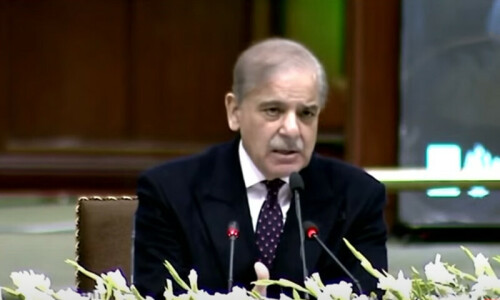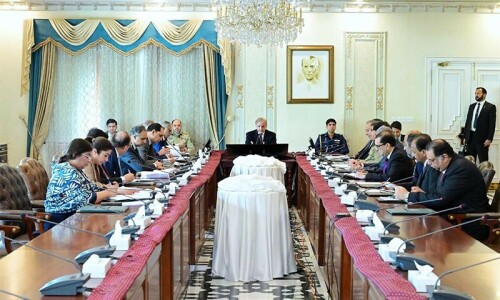Minister for Science and Technology Shibli Faraz on Wednesday said his ministry has submitted a report to a technical committee of the Election Commission of Pakistan (ECP) regarding electronic voting machines (EVMs) which "addressed all the problems" pointed out by the ECP.
The minister made the comment during a press conference in Islamabad a day after the ECP raised 37 objections to the introduction of EVMs in a document submitted to the Senate Standing Committee on Parliamentary Affairs.
Faraz said that 27 of the objections raised by the ECP were related to the election commission's current capabilities while 10 were related to EVMs. The EVM developed by the Ministry of Science and Technology addressed all 10 of those objections, he said, while emphasising that the 27 other concerns were "not the ministry's work".
He shared that the ECP had formed a technical committee to analyse the EVMs at the end of July. A technical team of the Ministry of Science and Technology participated in the first meeting of the committee which was held today.
It submitted "most of the reports" that the ECP had asked for, the minister said, adding that additional documents would be provided to the ECP in the next meeting which is due to be held on Sept 15.
The minister denied that the ECP's objections were related to the technical aspects of the EVM as it was being analysed technically by the ECP for the first time today, insisting that "we have solved all the problems in this (report submitted to the Election Commission)."
The government was "fully determined" to do the legislation needed and use EVMs in the 2023 general elections, the minister stressed.
In response to a question, Faraz said he was "not interested" in what international experts had to say about the EVM. The PTI-government had offered political parties to bring in their own experts, including from abroad, to analyse the machine, he said.
He said that a politician had questioned how the machine would work in case there was no electricity at the polling station. "The machine is battery operated. You can also operate it on K2. The battery life is 24 hours so it is not dependent on electricity."
He pointed out that the ECP had not accepted the machine but had not rejected it either since the technical process was yet to be completed.
"Our work is making the law and fulfilling the ECP's requirements for the machine," Faraz said, adding that it was the ECP's duty to figure out the mechanism to utilise it.
Read: Reconsidering electronic voting
Faraz assured that the country had the capacity to produce the number of electronic voting machines that would be required for elections.
"You can do training, manufacturing and deployment in two years but that is not our work, it is the ECP's," he added.
In response to another question about the government's plans in case both the ECP and the opposition rejected the EVM, the minister said, "It is the government's job to create a law. When it is done, all state institutions will have to follow it and there cannot be a question of opposition."
He disclosed that the ministry was holding a hackathon to establish the security of the machine.
ECP's objections
In its document submitted to the Senate Standing Committee on Parliamentary Affairs on Tuesday, the ECP said time was too short for the large-scale procurement and deployment of EVMs and imparting training to a massive number of operators, adding that it was not advisable to introduce EVM nationwide in one go. It said the polls on one day as required under the law would be nearly impossible.
The ECP also referred to various other issues linked with the use of EVM, including lack of ballot secrecy, lack of capacity at all levels and lack of ensuring security and chain of custody for the machines at rest and during transportation. It also pointed out that there would be no evidence available in case of election dispute. The ECP noted that data integration and configuration issues may crop up due to court orders at the eleventh hour regarding a change in ballot paper.
The ECP said EVMs could not prevent low voters' turnout, low women's turnout, misuse of state authority, election fraud, electronic ballot stuffing, vote buying, the law and order situation, dishonest polling staff, widespread political and electoral violence and abuse of state resources.
It went on to say that in case of introduction of the technology in haste, the conduct of free, fair, credible and transparent elections as per the Constitution was not possible. It was pointed out that Germany, Holland, Ireland, Italy and Finland had abandoned the use of EVMs due to lack of security.
About prerequisites for introduction of EVMs, the ECP said these included availability of a secure and reliable solution, political consensus among the parties represented in parliament and amendments to the Constitution, acts and rules, infrastructure deployment for staggered elections, threat models and risks assessment and disaster recovery plan.
















































